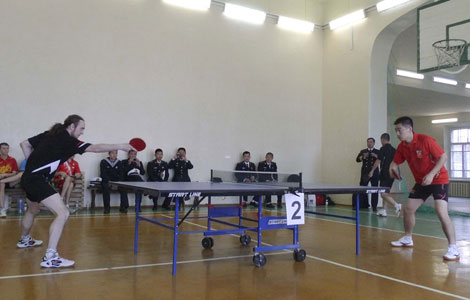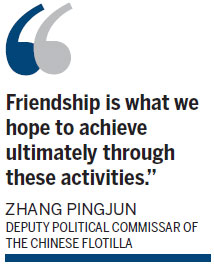Navies bond over sports matches

Players from the Chinese and Russian navies play a friendly ping-pong game on Saturday in Vladivostok, Russia, during the China-Russia "Joint Sea 2013" exercises. Pu Zhendong / China Daily |

Sailors from China, Russia build trust ahead of joint drill
"Ping-pong diplomacy" is once again showing its magic as players from the Chinese and Russian navies hugged and laughed over a ping-pong competition on Saturday.
"We do not speak the same language, but sports is a unique global language that helps us communicate and become friends with each other," said Li Feng, one of the six ping-pong players from the Chinese navy, after the Chinese won seven of nine games with their Russian counterparts in Vladivostok.
Ping-pong, a popular game across China, was part of the exchange program under the China-Russia "Joint Sea 2013" exercises, which began on July 5 and continue through Friday in Peter the Great Bay near Vladivostok.
The Chinese team's leader, Guo Yuewu, said his team's wins were not as easy as the results suggested.
"They (Russian player) played incredibly well, and we were evenly matched," Guo said. "The Russian players might just lack some experience and a bit of luck."
Li was also impressed by his Russian opponents' strong will and sense of humor. He said members of the teams became friends quickly after the games because of their mutual interest in ping-pong.
Attracted by the ping-pong competition, chief directors of the two task forces came to cheer for the athletes.
Leonid Sukhanov, deputy chief of the Russian Navy Main Staff, shrugged off the results and said with a laughter that the Russian team lost only because he could not compete due to sickness.
Hearing that, Ding Yiping, deputy commander of the Chinese People's Liberation Army navy, smashed several nice shots against Wang Zhen, the star player of the Chinese team.
'Too strong to beat'
Wang, a former member of the national team, drew cheers from his rivals and the audience with his excellent ping-pong skills.
Vladimir Zaserkovmil was one of the two winning Russian players. The 31-year-old is serving in his navy's security department as a driver.
"We learned ping-pong in college, practiced it every other day and had league matches on the weekends," he said. "I felt lucky and excited to win a game, but the entire Chinese team was too strong to beat."
"After all, the result is not important. The Chinese sailors taught me some new techniques and game strategy that I found interesting," he added.
Wang said the two teams exchanged ping-pong paddles after the match and played some China-Russia mixed-doubles games. "It was enjoyable," he said.
Thirteen-year-old Izotov Vadim, the youngest audience, said the contest was the first time he has seen the Chinese navy, which he said is very friendly.
"It's great to see in the games that the Chinese navy shares a similar philosophy with the Russian military forces: 'One for all, all for one'," he said.
Ping-pong has played a key role in China's diplomatic history. In the early 1970s, ping-pong delegations from the United States and China visited each other's countries, facilitating the re-establishment of diplomatic ties between Beijing and Washington.
In addition to the ping-pong games, soldiers of the two countries also participated in friendly matches in volleyball and soccer. The ensemble of Russia's Pacific Fleet on Saturday conducted a special performance for the visiting Chinese navy.
On Sunday, Chinese naval soccer teams lost 1-2 and 1-3 to Russia.
Diplomatic ties and military-to-military exchanges between China and Russia have been strengthened over the years.
Last year, during the two countries' first naval drills in the Yellow Sea, Chinese and Russian soldiers also competed in games such as tug of war.
Zhang Pingjun, deputy political commissar of the Chinese flotilla, said that the sports and cultural exchanges offer a perfect platform for soldiers of the two countries to get in touch and build deeper trust.
"Friendship is what we hope to achieve ultimately through these activities," he said.
Contact the writers at puzhendong@chinadaily.com.cn and zhaoshengnan@chinadaily.com.cn








